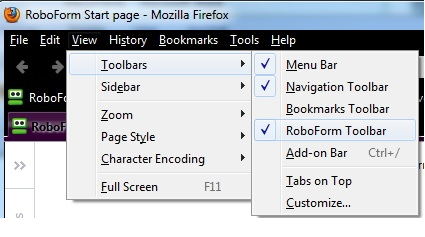

Even consumer focussed add-ons like RoboForm need updating for every Firefox release. It’s not just developer centric tools like HttpWatch that are affected.
FIREFOX AND ROBOFORM INSTALL
Also, we have to add at least one new DLL to our install program for every new Firefox release.

That means it’s impossible for us to ship a version of HttpWatch that will work with a future release of Firefox. Binary components must be recompiled to work with each new release: There’s no guarantee that code in an extension will work with a new version of Firefox.įor native binary components like HttpWatch the picture is much worse. That’s all changed so anything can be updated. In the past many interfaces were said to be ‘frozen’ meaning that script based and native binary extensions could rely on using them at any point in the future. While changing to this new model, Mozilla largely gave up on backwards compatibility to speed up their development process. Releasing often seems like a good idea unless you’re in a controlled corporate environment or you develop extensions for a living. So in the previous four years we had five major new builds of Firefox, but this year we’ve already had versions 4, 5 and 6. Septemin Firefox, HttpWatch, Internet ExplorerĮarlier this year Mozilla shifted from releasing a new version every year or so, to once every six weeks. Poll: How Often Should New Firefox Versions Be Released?


 0 kommentar(er)
0 kommentar(er)
